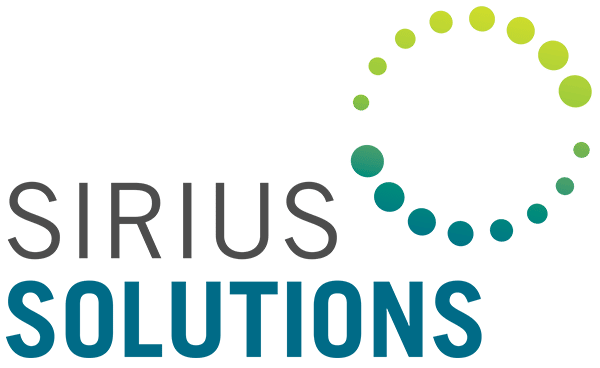System implementation that is rooted in a thorough comprehension of both financial and operational mechanisms within the organization is essential for successful organizational growth. It is at this crossroads of forward-thinking innovation and adaptability that organizational cultures and strategies are put to the test, and an organization’s genuine adaptableness is demonstrated. Achieving success in system implementation requires deep expertise and a tailored strategy. The significance of this synergy becomes evident when one considers a recent strategic partnership between an independent packaging integrator/distributor and Sirius Solutions. Brian Hebert, one of Sirius Solutions’ Senior Consultants with a wealth of industry experience, shares how he bridges the gap between finance and operations. His experience serves as a testament to the variety of opportunities and challenges that come with implementing new systems. He notes,
“It’s about understanding the complexities of each client’s unique system and aligning them with the operational ethos of their organization.”
This introduction lays the groundwork for a discussion of how to successfully navigate the challenges of system setup, transforming setbacks into triumphs and ensuring clients’ transitions are seamless, strategically sound, and future-proof.
Role of Sirius Solutions' System Implementation
A thorough grasp of client stressors is essential for a successful system implementation, and Sirius Solutions weaves this value into its methodology. Beyond providing technical support, Sirius Solutions acts as a strategic partner, helping clients navigate the complexities of system implementation with increasing business efficiency.
We do this by creating synergies between the diverse facets of business operations, leveraging our deep expertise in both business and financial acumen. We empower our clients to undergo real transformation by actively engaging with all levels of organizations, ensuring that change is not only envisioned but also effectively implemented. Our experts are leaders in their respective fields and bring a unique combination of strategic insight and practical experience, ensuring that every system implementation is grounded in a deep understanding of both the financial and operational aspects of the business.
Tailoring Strategies to Client Needs
Our experts take great satisfaction in their ability to customize plans to meet every client’s particular needs. Since no two system implementations are alike, customization becomes essential. Hebert, an experienced implementor, emphasizes,
“Each client presents a different set of opportunities and challenges.” It is our responsibility to recognize and manage these factors, guaranteeing an easy transition to the new system.
Bridging Operational and Financial Gaps
During new system implementation, one essential element is integrating an organization’s operational and financial sides. Hebert’s varied industry background, which includes real estate, healthcare, and more, emphasizes the importance of this strategy.
“It is essential to understand the sector and both sides of the business within that industry.” This enables us to put in place systems that not only function technically but also support the operational and financial objectives of clients.
Calling Upon Diverse Industry Expertise
Experience and thought leadership in diverse sectors give implementation strategies additional depth and perspective. One can foresee and mitigate industry-specific issues with a rich, deep historical understanding. As Hebert says, “Our strength is our range of diverse experience.” This enables Sirius Solutions to offer comprehensive and in-depth insights, guaranteeing clients receive the best advice.
Focusing on Long-Term Success
Collaboration with Sirius Solutions extends beyond successful system implementation. The objective is to guarantee long-term project success. This includes setting up sustainable procedures, educating and training staff, and offering continuing support.
Hebert continues, “Our objective is to empower clients to use their new system effectively and to thrive with it as opposed to failing to adapt, which is all too commonplace.”
Sirius Solutions grasps the complex and pivotal role that organizational change plays in system implementation, seamlessly integrating advanced transformation principles. In this way, client objectives are realized with dedicated transformation resources for process design and user acceptance testing and training. Sirius Solutions concentrates on customized methods to fill gaps, leverage industry knowledge, and guarantee long-term success.
Challenges and Strategies in System Implementation
Getting a system implementation project successfully launched comes with its own complications. However, these challenges can be overcome with customized, suitable strategies.
Identifying and Addressing Common Challenges
Staff reluctance to change, integration complications, and lack of technical resources are common issues in system implementation projects. The key to success is acknowledging these common challenges and addressing them ahead of time. “Each endeavor has its own set of challenges, but the common thread is the need for a deep understanding of both the technical and human elements involved,” says Hebert, reflecting on his varied experiences.
A more focused and efficient execution plan is made possible when one is aware of the unique requirements and intricacies of the organization. This strategy aims to match not only with the client’s operating procedures and culture but also with their technical resources.
Bridging Operational and Financial Aspects
Ensuring the new system aligns with the organization’s financial and operational objectives represents a critical implementation component. According to Hebert, “Our role is to make sure that the system implementation is both a technical and a strategic success.”
Training and Empowerment
Offering comprehensive and impactful training to staff constitutes another crucial component. Staff must receive training on the new system and gain an understanding of its business implications if the system launch is to be successful in the long run. This strategy promotes a culture of continuous improvement and guarantees sustainability.
Continuing Support and Monitoring
Continuous support ensures that any uncovered issues after the initial launch are resolved quickly and that the system keeps up with the organization’s changing requirements.
A sophisticated strategy that considers both the technical and human components of change is vital to implementing a system successfully. Navigating these elements requires a tailored approach, proficiency in bridging gaps, emphasis on training and empowerment, and continuous support.
Success Story: A Successful System Implementation
The system implementation journey of an independent packaging equipment integrator/distributor, which Sirius Solutions partnered with, is an excellent example of a success story that demonstrates the complex change management procedures in system implementation.
Background and Initial Challenges
Our client, a specialized supplier of many major brands’ repacking services, proactively identified opportunities for innovation within their operational framework. This forward-thinking approach paved the way for enhanced efficiency. The family-run organization wanted to switch from the current structure to a more streamlined and effective one. According to Sirius Solutions’ first assessment, a thorough operational redesign was required, including a switch to the new Plex system.
Sirius Solutions' Strategic Approach
Sirius Solutions applied a strategic approach, focused on understanding the unique aspects of our client’s operations. As Hebert points out, “Our initial mission was gaining an understanding of our client’s processes to identify the gaps in their existing system.” This in-depth analysis allowed us to customize a plan that met the organization’s technical requirements while complementing its operational and financial goals.
Implementing Plex and Overcoming Obstacles
Plex implementation presented a unique set of difficulties. Wanting to ensure the new system was correctly configured and suited to the demands of our client, Sirius Solutions focused on bridging the gap between the implementer and the finance team. As Hebert said, “We played a key role in keeping the implementer on schedule and ensuring the system met our client’s expectations.”
Training and Transition
The training of our client’s staff constituted a significant portion of the project. This step was essential for the implementation to be successful in the long run. It was critical that staff were not simply provided instruction on the new system but also fully understood and embraced its advantages and potential.
Outcomes and Success Metrics
As a result of the successful implementation, a completely integrated system with consolidated production and financials was created, enhancing inventory management, cost-tracking accuracy, and overall efficiency. As Hebert explained, “More accurate financial reporting and operational insights were produced by the new system, enabling real-time tracking and greatly reducing manual interventions, creating time and cost savings.”
Long-Term Impact and Client Satisfaction
Successful system implementation has had a significant long-term effect on the organization. Our client saw improved decision-making, simpler processes, and an empowered staff. Our client’s realization of the desired results while partnering with Sirius Solutions is evident in their continuous engagement with our team for additional enhancements and support. Hebert says in closing, “Our client’s success is a testament to our ability to improve business processes as opposed to just implementing a system.”
This success story highlights Sirius Solutions’ proficiency in managing intricate projects, coordinating technology with business requirements, and guaranteeing a lasting and significant shift in processes for real business value.
Lessons Learned and Best Practices
The successful system implementation at our client offers valuable lessons and best practice insights for future projects. These insights are critical for organizations looking to navigate their own system implementation.
Embrace a Holistic Approach
A holistic approach to system implementation is key. It is vital to consider how the new system impacts every facet of the organization, from operations to finance, not just the technical aspects. “A system implementation is successful when it aligns with the overall strategy and culture of the business,” Hebert emphasizes.
Build Customization and Flexibility
Customization and flexibility are critical. Each organization has its unique desired results and challenges. Tailoring the implementation strategy to these specific requirements ensures an effective and smooth transition. “Understanding our client’s unique business model and adapting our approach accordingly was key to our success,” Hebert notes.
Focus on Training and Empowerment
Training and empowering staff with new ways of working effectively is crucial for long-term success. “The goal is not just to implement a system but to ensure that the client’s team is comfortable and proficient in using it,” says Hebert. This approach fosters a sense of ownership and increases business efficiency.
Monitor and Support
Post-implementation support and continuous monitoring are essential. Addressing uncovered issues promptly and adjusting as needed ensures the system remains effective and aligned with the organization’s evolving needs. Hebert reflects,
“Ongoing support and adaptation are crucial for maintaining the efficiency and relevance of the system.”
Learn from Challenges
Each challenge encountered during system implementation is an opportunity to learn and improve. This successful experience with our client underscores the importance of thorough planning, clear communication, and proactively addressing potential issues. “Every challenge faced helps refine strategies and approaches for future projects,” Hebert explains.
Involve All Stakeholders
Involving stakeholders at every level of the organization in the implementation process is vital. This inclusive approach ensures stakeholder buy-in, reduces resistance, and ensures the overall effectiveness of the new system. “Engaging with stakeholders from the start helps align their expectations and strengthen their support,” Hebert adds.
Best Practices for Future Implementations
Best practices for future system implementations include:
- Create a thorough strategy that aligns with organizational objectives.
- Form a customized approach to fit the specific needs of the organization.
- Provide staff with extensive training and resources for the new ways of working.
- Establish continuous support and monitoring mechanisms.
- Engage stakeholders throughout the process to ensure alignment and adoption.
In conclusion, insights gained from Sirius Solutions’ successful system implementation provide a roadmap for organizations looking to embark on their own system implementation journey. By adopting these best practices and lessons learned, organizations will navigate the complexities of system implementation with greater confidence and success.

